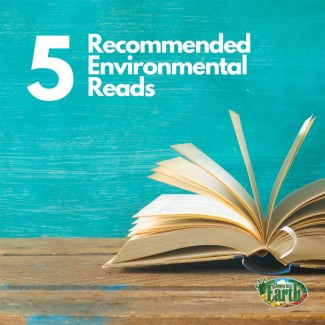
Here's a short list of a few of Down to Earth's Recommended Environmental Reads.
Here are few options to access these books from home:
- Hawaii State Library & Overdrive: FREE ebooks and audio books for all ages
- Scribd: Unlimited books, audiobooks, current magazines, and news. Scribd 30 day free trial
-
Small Is Beautiful: Economics as if People Mattered by E. F. Schumacher, 1973
Small Is Beautiful is Oxford-trained economist E. F. Schumacher’s classic call for the end of excessive consumption. Schumacher inspired such movements as “Buy Locally” and “Fair Trade,” while voicing strong opposition to “casino capitalism” and wasteful corporate behemoths. Named one of the Times Literary Supplement’s 100 Most Influential Books Since World War II, Small Is Beautiful presents eminently logical arguments for building our economies around the needs of communities, not corporations.
-
101 Ways to Go Zero Waste, by Kathryn Kellogg, 2019
We all know how important it is to reduce our environmental footprint, but it can be daunting to know where to begin. Enter Kathryn Kellogg, who can fit all her trash from the past two years into a 16-ounce mason jar. How? She starts by saying “no” to straws and grocery bags, and “yes” to a reusable water bottle and compostable dish scrubbers. In 101 Ways to Go Zero Waste, Kellogg shares these tips and more, along with DIY recipes for beauty and home; advice for responsible consumption and making better choices for home goods, fashion, and the office; and even secrets for how to go waste free at the airport. “It’s not about perfection,” she says. “It’s about making better choices.”
-
All You Need Is Less: The Eco-friendly Guide to Guilt-Free Green Living and Stress-Free Simplicity, by Madeleine Somerville, 2014
Most eco-friendly books start with terror-inducing lists of the carcinogenic chemicals you are liberally slathering all over every single surface in your house, painting most people as unwitting eco-villains, happily Lysol-ing their way straight to hell. Well, readers can just relax and unpack the (plastic) bags -- no guilt trips today! All You Need is Less is about realistically adopting an eco-friendly lifestyle without either losing your mind from soul-destroying guilt or becoming a preachy know-it-all whom everyone loathes.
-
The Story Of Stuff: How Our Obsession With Stuff Is Trashing the Planet, Our Communities, And Our Health—And A Vision For Change, by Annie Leonard, 2010
We have a problem with Stuff. With just five percent of the world's population, we're consuming 30 percent of the world's resources and creating 30 percent of the world's waste. Here, Leonard reveals the true story behind our possessions; why it's cheaper to replace a broken TV than to fix it; how "perceived obsolescence" encourages us to toss everything from shoes to cell phones while they're still in perfect shape; and how factory workers in Haiti, mine workers in Congo, and others pay for our cheap goods with their health, safety, and quality of life.
-
Good Growing: Why Organic Farming Works, by Leslie A. Duram, 2005
Over the past decade, organic products have become the fastest growing sector of agriculture, with an annual increase of at least 20 percent. This book explains why organic production and consumption have seen such phenomenal growth in recent years—and, even more important, why they should. A clear-eyed, close-up look at the compelling reasons for organic farming and the methods that make it work, Good Growing begins with a frank account of the problems with conventional industrial agriculture—the pesticide use, pollution, and corporate control that have undermined public health and devastated rural towns and family farms.